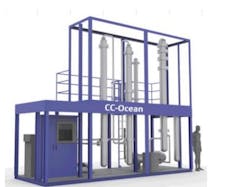Japanese trio to test marine-based carbon capture system
Offshore staff
TOKYO – Mitsubishi Shipbuilding Co. Ltd. is working in cooperation with Kawasaki Kisen Kaisha Ltd. (K Line) and ClassNK to conduct test operations and measurements for a small-scale ship-based CO2 capture demonstration plant. The aim is to verify the equipment’s use as a marine-based CO2 capture system.
This project is being conducted with support from the Maritime Bureau of Japan’s Ministry of Land, Infrastructure, Transport and Tourism, as part of its assistance project for research and development of technological advancements in marine resource development.
The demonstration involves converting the design of an existing CO2 capture system for onshore power plants to a marine environment, and installing it on board a vessel. This project, called Carbon Capture on the Ocean (CC-Ocean), is intended to achieve CO2 capture at sea, a world first.
The two-year project began this month with the launch of a hazard identification study for the design of the demonstration plant and the onboard installation, with verification from ClassNK. In mid-2021, Mitsubishi Shipbuilding will manufacture and test the demonstration plant. It will then be deployed on K Line’s Corona Utility, a thermal coal carrier operated for Tohoku Electric Power Co. Inc.
Through operational and performance confirmation in an actual marine environment, Mitsubishi Shipbuilding will then determine the system specification requirements as a marine-based device and will also consider how to make the plant more compact.
This demonstration experiment conducted at sea is the first of its kind in the world, the companies claimed. The knowledge gained will be used for future development of technologies and systems to capture CO2 from the exhaust gases of marine equipment and vessels.
In addition, the captured CO2 is expected to be recycled for use as a new source of CO2 for enhanced oil recovery processes, or as raw material in synthetic fuel through methanation. The companies said the project will contribute to the long-term reduction of greenhouse gas emissions.
08/31/2020
